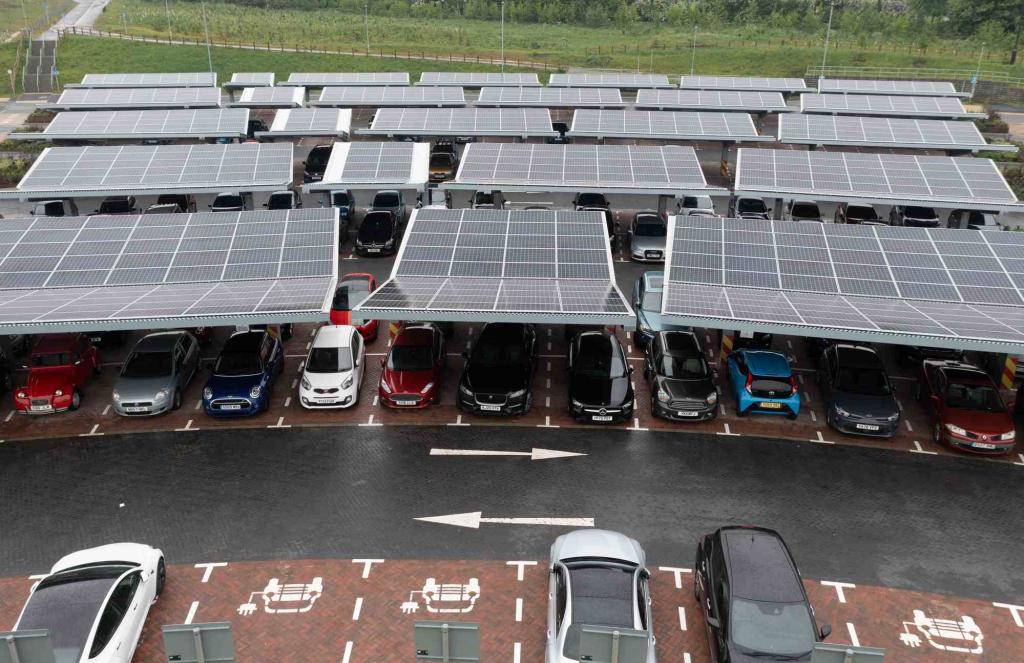Thessaloniki gets ready for its metro launch in November
The underground rapid transit lines have been under construction for almost two decades due to various project delays
 TheMayor.EU logo
TheMayor.EU logo 
The city has provided 1.5 million euros for projects using new urban areas for electricity generation , Source: Depositphotos
The city has created a funding mechanism for flying roofs, but applicants will have to compete for limited resources
Last week, local authorities in Vienna announced a new funding scheme for installing so-called solar flying roofs. The funding pot for the programme would be separate from any other photovoltaic funding scheme by the city and wants to focus on barren areas that have a lot of energy potential.
These include parking lots, petrol stations and warehouses, and spaces with flat areas that get unobstructed sunlight. Moreover, according to the city, the funding would cover around 30% of a project’s cost while submissions would be limited to two per applicant.
Importantly, the submissions process started on 15 April and will be open until 15 October, however, the funding scheme is limited and cannot service all potentially viable candidates, which could trigger a photovoltaic rush for local authorities.
The Austrian capital has steadily grown its share of energy production through solar over recent years. In 2020, the city’s electricity company Wien Energie explained that it operated 260 photovoltaic plants, which provide up to 60 megawatts at peak production, powering around 25,000 homes.
Currently, according to the city, around 5,000 photovoltaic systems are installed on roofs, facades and open spaces throughout the city, both public and private. But it is not enough and especially with the goal of reaching climate neutrality by 2040, local officials have to constantly find new ways to expand the viable territory for installing even more solar panels.
This is where parking lots, warehouses and petrol stations come in, territories that are largely unexploited up to now. The city has provided 1.5 million euros for the scheme, which will be handed out to project recipients in the form of one lump sum.
However, the exact amount is determined by the size of the solar plant. Solar systems that can produce up to 100 kilowatts at peak production (kWp) will receive 750 euros per kWp. For capacities higher than 101 kWp, the city will provide 600 euros per kWp. Additionally, each project can be funded by a maximum of 200,000 euros and up to 30% of the costs.

The underground rapid transit lines have been under construction for almost two decades due to various project delays

Now you can get your wine in Talence by paying directly in Bitcoin

That’s because the state has to spend money on updating the railway infrastructure rather than subsidizing the cost of the popular pass

Rethinking renewable energy sources for the urban landscape

The examples, compiled by Beyond Fossil Fuels, can inform and inspire communities and entrepreneurs that still feel trepidation at the prospect of energy transition

Now you can get your wine in Talence by paying directly in Bitcoin

The 10th European Conference on Sustainable Cities and Towns (ESCT) sets the stage for stronger cooperation between the EU, national and local level to fast track Europe's transition to climate neutrality.

At least, that’s the promise made by the mayor of Paris, Anne Hidalgo

The underground rapid transit lines have been under construction for almost two decades due to various project delays

At least, that’s the promise made by the mayor of Paris, Anne Hidalgo

Hostal de Pinós is located in the geographical centre of the autonomous region

Despite its church-y name, the district has long been known as the hangout spot for the artsy crowds

Urban dwellers across the EU are having a say in making their surroundings friendlier to people and the environment.

Forests in the EU can help green the European construction industry and bolster a continent-wide push for architectural improvements.

Apply by 10 November and do your part for the transformation of European public spaces

An interview with the Mayor of a Polish city that seeks to reinvent itself

An interview with the newly elected ICLEI President and Mayor of Malmö

A conversation with the Mayor of Lisbon about the spirit and dimensions of innovation present in the Portuguese capital














